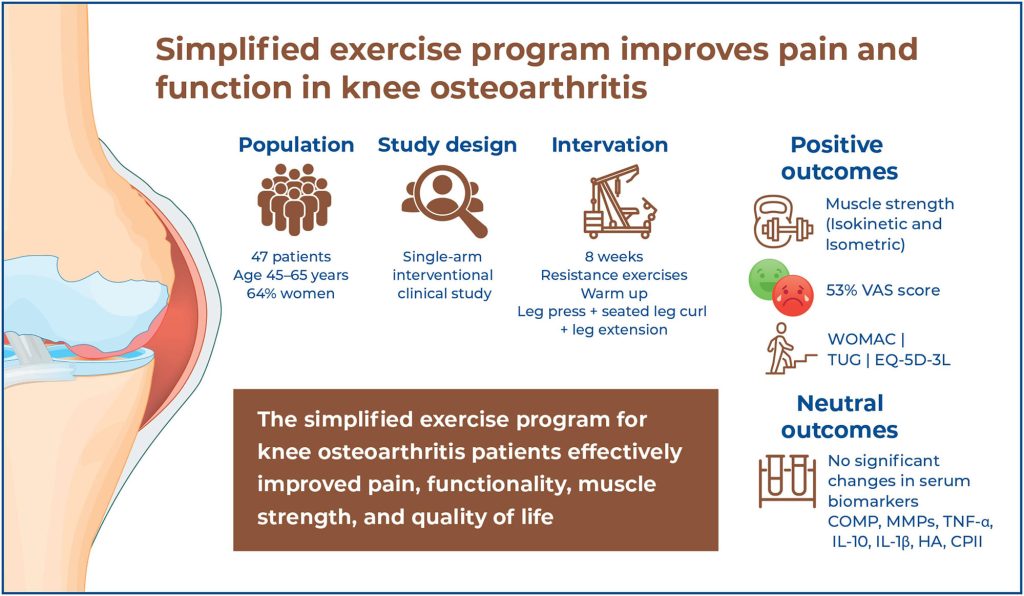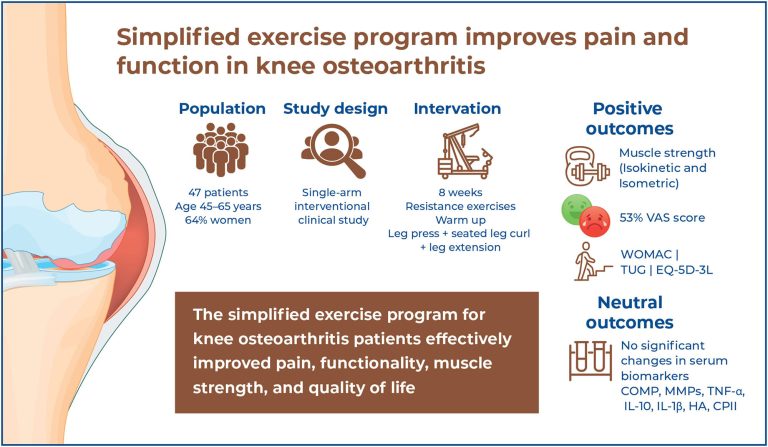einstein (São Paulo). 13/nov/2025;23:eAO1192.
Effect of simplified exercise program on quality of life, biomarkers, pain and muscle strength of individuals with knee osteoarthritis
DOI: 10.31744/einstein_journal/2025AO1192
Highlights
■ The exercise program reduced the WOMAC score by 50%, VAS score by 53%, and improved isokinetic strength.
■ There were no significant changes in levels of serum COMP, MMPs, or pro-inflammatory cytokines.
■ Biomarker levels did not correlate with clinical improvement outcomes.
■ This exercise program is feasible for knee osteoarthritis management in primary care.
ABSTRACT
Objective:
To evaluate a simplified exercise program for patients with knee osteoarthritis in terms of pain, functionality, muscle strength, and quality of life. The correlation of serum levels of molecules and cytokines was evaluated after the exercise program.
Methods:
Overall, 47 patients with knee osteoarthritis participated in this single-arm interventional study. Outcomes were assessed using the Western Ontario and McMaster Universities Osteoarthritis Index, Quality of Life, Visual Analog Scale, Timed Up and Go functional test, and muscle strength assessment. Serum levels of molecules and cytokines were analyzed using enzyme-linked immunosorbent assays.
Results:
The program resulted in improvements in pain and physical function (0.21 points; 95%CI=-0.26; −0.17), Visual Analog Scale (1.50; 95%CI=-1.90; −1.10), EuroQol-5 Dimension 3-Level (0.16; 95%CI=0.100; 0.227), and Timed Up and Go test (0.40; 95%CI=-0.57; −0.23). Significant differences were noted in the isokinetic knee flexion peak torque (0.16; 95%CI=0.10; 0.22), isometric knee extension (0.31; 95%CI=0.20; 0.43), and flexion (0.18; 95%CI=0.12; 0.23) peak torques for osteoarthritis. However, there was no significant difference in serum biomarker levels after the program, and there was no correlation between serum biomarker levels and clinical improvement outcomes.
Conclusion:
The simplified exercise program for patients with knee osteoarthritis patients effectively improved pain, functionality, muscle strength, and quality of life. However, biomarkers do not provide evidence of clinical improvement.
[…]
Palavras-chave: Osteoarthritis, knee; Muscle strength; Biomarkers; Exercise therapy; Pain measurement; Quality of life
73



